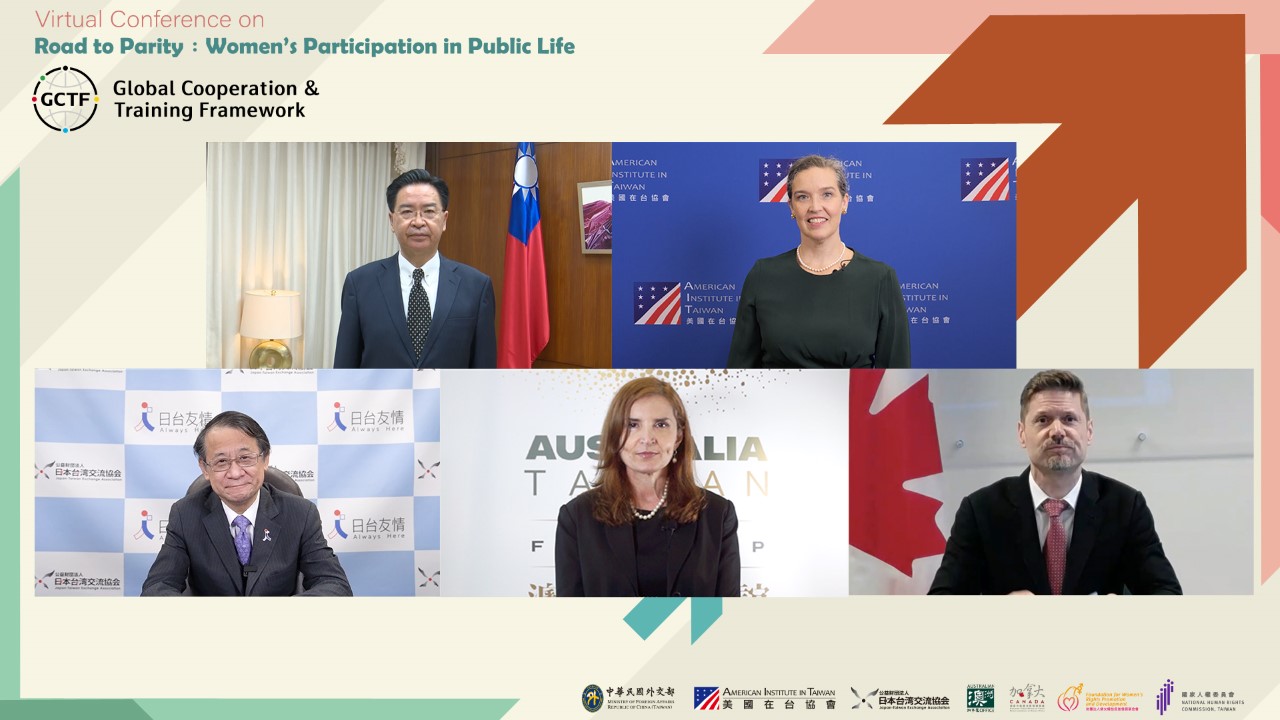On October 27th, the Japan-Taiwan Exchange Association co-hosted a Global Cooperation and Training Framework (GCTF) virtual seminar with the theme of Road to Parity: Women’s Participation in Public Life with the Ministry of Foreign Affairs (Taiwan), the National Human Rights Commission of Taiwan, the Foundation for Women’s Rights Promotion and Development, the American Institute in Taiwan (AIT), the Australian Office Taipei and the Canadian Trade Office in Taipei and Chief Representative, Hiroyasu Izumi gave a speech at the opening ceremony.
More and more people are beginning to acknowledge the importance of building a social system in which women can be active but, on the other hand, due to the spread of COVID-19, we are facing new issues such as an increase in unemployment among women. In such a situation, experts from Japan, Taiwan, the US, Australia, and Canada shared their knowledge in order to reform to create working environments in which it is easy for women to work as a society as a whole.
The speech from Chief Representative Izumi follows.
Chief Representative, Jenny Bloomfield
Foreign Minister, Joseph WU,
Director, Sandra Oudkirk,
Executive Director, Jordan Reeves,
Distinguished guests
Women's empowerment in Taiwan has made a lot of progress in the past few decades. Many women in Taiwan are very active in all fields, not least President Tsai Ing-wen.
In Japan, some say that it is quite difficult for women to pursue careers in business or politics because of the so-called glass ceiling.
However, the Fifth Basic Plan for Gender Equality since the Basic Law for a Gender-equal Society was enacted in 1999 was approved by Prime Minister Suga’s Cabinet in December last year, announcing concrete measures to promote proactive efforts to achieve a gender-equal society.
In terms of international assistance, the Japanese government announced the “Development Strategy for Gender Equality and Women’s Empowerment” in May 2016 and has been providing diverse assistance such as support for maternal and child health, training female police officers, and supporting female entrepreneurs.
While more and more people are beginning to recognize the importance of building social systems to achieve gender equality and women’s empowerment, we are also facing new challenges, such as the rising unemployment rate among women due to the spread of COVID-19. On the other hand, we can say that now is a chance for society as a whole to improve working environments for women through new information technology, innovation, or new ways of thinking.
In today's workshop, Ms. Michiko Achilles from Japan will talk about the current situation and challenges of promoting women’s empowerment in Japan, as well as the G20 EMPOWR initiative. In order to achieve a gender-equal society, it is important for people from various backgrounds to share their knowledge and make improvements. In addition, achieving gender equality and women's empowerment is one of the 17 Sustainable Development Goals. Today's seminar is very meaningful from this perspective, and I look forward to a lively discussion.
Finally, I highly appreciate Australia’s participation in the GCTF as a full partner and Canada’s first participation as a co-host. We look forward to continuing to work closely together. I would also like to express my gratitude to the Foundation for Women’s Rights Promotion & Development and all the people involved for all their efforts in organizing this workshop.
Thank you very much.
